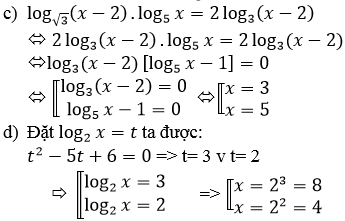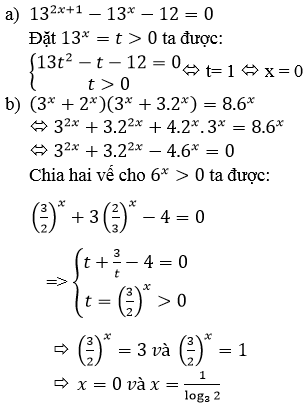Hãy nhập câu hỏi của bạn vào đây, nếu là tài khoản VIP, bạn sẽ được ưu tiên trả lời.

Điều kiện x>0. Nhận thấy x=2 là nghiệm.
Nếu x>2 thì
\(\frac{x}{2}>\frac{x+2}{4}>1\); \(\frac{x+1}{3}>\frac{x+3}{5}>1\)
Suy ra
\(\log_2\frac{x}{2}>\log_2\frac{x+2}{4}>\log_4\frac{x+2}{4}\)hay :\(\log_2x>\log_2\left(x+2\right)\)
\(\log_3\frac{x+1}{3}>\log_3\frac{x+3}{5}>\log_5\frac{x+3}{5}\) hay \(\log_3\left(x+1\right)>\log_5\left(x+3\right)\)
Suy ra vế trái < vế phải, phương trình vô nghiệm.
Đáp số x=2


ĐKXĐ: \(x>1\)
\(\Leftrightarrow\log_5\left(\dfrac{\ln x}{\ln3}\right)=\log_3\left(\dfrac{\ln x}{\ln5}\right)\)
\(\Leftrightarrow\log_5\left(\ln x\right)-\log_5\left(\ln3\right)=\log_3\left(\ln x\right)-\log_3\left(\ln5\right)\)
\(\Leftrightarrow\dfrac{\ln\left(\ln x\right)}{\ln5}-\log_5\left(\ln3\right)=\dfrac{\ln\left(\ln x\right)}{\ln3}-\log_3\left(\ln5\right)\)
\(\Leftrightarrow\ln\left(\ln x\right)\left(\dfrac{1}{\ln5}-\dfrac{1}{\ln3}\right)=\log_5\left(\ln3\right)-\log_3\left(\ln5\right)\)
\(\Leftrightarrow\ln\left(\ln x\right)=\dfrac{\log_5\left(\ln3\right)-\log_3\left(\ln5\right)}{\dfrac{1}{\ln5}-\dfrac{1}{\ln3}}=\dfrac{\ln3.\ln5\left[\log_5\left(\ln3\right)-\log_3\left(\ln5\right)\right]}{\ln3-\ln5}\)
\(\Rightarrow x=e^{e^{\frac{\ln{3}.\ln{5}[\log_{5}(\ln{3})-\log_{3}(\ln{5})]}{\ln{3}-\ln{5}}}}\)

a) Đặt t = 13x > 0 ta được phương trình:
13t2 – t – 12 = 0 ⇔ (t – 1)(13t + 12) = 0
⇔ t = 1 ⇔ 13x = 1 ⇔ x = 0
b)
Chia cả hai vế phương trình cho 9x ta được phương trình tương đương
(1+(23)x)(1+3.(23)x)=8.(23)x(1+(23)x)(1+3.(23)x)=8.(23)x
Đặt t=(23)xt=(23)x (t > 0) , ta được phương trình:
(1 + t)(1 + 3t) = 8t ⇔ 3t2 – 4t + 1 = 0 ⇔ t∈{13,1}t∈{13,1}
Với t=13t=13 ta được nghiệm x=log2313x=log2313
Với t = 1 ta được nghiệm x = 0
c) Điều kiện: x > 2
Vì nên phương trình đã cho tương đương với:
[log3(x−2)=0log5x=1⇔[x=3x=5[log3(x−2)=0log5x=1⇔[x=3x=5
d) Điều kiện: x > 0
log22x – 5log2x + 6 = 0
⇔(log2x – 2)(log2x – 3) = 0
⇔ x ∈ {4, 8}

ĐKXĐ: \(x>1\)
\(\Leftrightarrow\frac{1}{2}log_2\left(log_2x\right)+log_2\left(\frac{1}{2}log_2x\right)\ge2\)
\(\Leftrightarrow log_2\left(\frac{1}{2}log_2x.\sqrt{log_2x}\right)\ge2\)
\(\Leftrightarrow\frac{1}{2}\sqrt{log_2^3x}\ge4\Leftrightarrow\sqrt{log^3_2x}\ge8\)
\(\Leftrightarrow log_2^3x\ge64\Leftrightarrow log_2x\ge4\)
\(\Rightarrow x\ge16\)

a:
ĐKXĐ: x+1>0 và x>0
=>x>0
=>\(log_2\left(x^2+x\right)=1\)
=>x^2+x=2
=>x^2+x-2=0
=>(x+2)(x-1)=0
=>x=1(nhận) hoặc x=-2(loại)
c: ĐKXĐ: x-1>0 và x-2>0
=>x>2
\(PT\Leftrightarrow log_2\left(x^2-3x+2\right)=3\)
=>\(\Leftrightarrow x^2-3x+2=8\)
=>x^2-3x-6=0
=>\(\left[{}\begin{matrix}x=\dfrac{3+\sqrt{33}}{2}\left(nhận\right)\\x=\dfrac{3-\sqrt{33}}{2}\left(loại\right)\end{matrix}\right.\)

a. Vì \(0< 0,1< 1\) nên bất phương trình đã cho
\(\Leftrightarrow0< x^2+x-2< x+3\)
\(\Leftrightarrow\left\{{}\begin{matrix}x^2+x-2>0\\x^2-5< 0\end{matrix}\right.\)
\(\Leftrightarrow\left\{{}\begin{matrix}\left[{}\begin{matrix}x< -2\\x>1\end{matrix}\right.\\-\sqrt{5}< x< \sqrt{5}\end{matrix}\right.\)
\(\Leftrightarrow\left\{{}\begin{matrix}-\sqrt{5}< x< -2\\1< x< \sqrt{5}\end{matrix}\right.\)
Vậy tập nghiệm của bất phương trình là \(S=\left\{-\sqrt{5};-2\right\}\) và \(\left\{1;\sqrt{5}\right\}\)
b. Điều kiện \(\left\{{}\begin{matrix}2-x>0\\x^2-6x+5>0\end{matrix}\right.\)
Ta có:
\(log_{\dfrac{1}{3}}\left(x^2-6x+5\right)+2log^3\left(2-x\right)\ge0\)
\(\Leftrightarrow log_{\dfrac{1}{3}}\left(x^2-6x+5\right)\ge log_{\dfrac{1}{3}}\left(2-x\right)^2\)
\(\Leftrightarrow x^2-6x+5\le\left(2-x\right)^2\)
\(\Leftrightarrow2x-1\ge0\)
Bất phương trình tương đương với:
\(\left\{{}\begin{matrix}x^2-6x+5>0\\2-x>0\\2x-1\ge0\end{matrix}\right.\) \(\Leftrightarrow\left\{{}\begin{matrix}\left[{}\begin{matrix}x< 1\\x>5\end{matrix}\right.\\x< 2\\x\ge\dfrac{1}{2}\end{matrix}\right.\)
\(\Leftrightarrow\dfrac{1}{2}\le x< 1\)
Vậy tập nghiệm của bất phương trình là: \(\left(\dfrac{1}{2};1\right)\)

Lời giải:
Để ý rằng \(\log _3(3^{x+1}-3)=\log_3[3(3^x-1)]=1+\log_3(3^x-1)\)
Đặt \(\log_3(3^x-1)=t\). Khi đó PT tương đương:
\(t(t+1)=6\Leftrightarrow (t-2)(t+3)=0\Rightarrow \)\(\left[{}\begin{matrix}t=2\\t=-3\end{matrix}\right.\)
Nếu \(t=2\rightarrow 3^x-1=9\Leftrightarrow 3^x=10\rightarrow x=\log_3(10)\)
Nếu \(t=-3\Rightarrow 3^x-1=\frac{1}{27}\Rightarrow 3^x=\frac{28}{27}\Rightarrow x=\log_3\left (\frac{28}{27}\right)\)

